Welcome to our complete guide to trekking Mount Toubkal! Immerse yourself in the vivid culture of Morocco and climb the highest peak in North Africa.
With breath-taking views of the Atlas Mountains, green valleys, and endearing Berber villages, Mount Toubkal will not disappoint. The trek may be moderate in difficulty, but the journey will be difficult to forget.
Below you will find a full guide on everything you will need to know before you climb Mount Toubkal. We booked our guided trip through a company called Skyhook, and had so much fun on this experience (see video below).
Mount Toubkal Overview
Where is Mount Toubkal?
Mount Toubkal or Jebel Toubkal is the highest peak in North Africa. Toubkal is apart of the Atlas Mountain Range and is located in the southwestern part of Morocco, about 60 km south of Marrakesh.
Can You Climb Mount Toubkal?
Mount Toubkal is a non-technical summit with its highest peak at 4,167 meters. At the peak awaits views of a dramatic border between land, ocean, and desert.
There are two approaches to reaching Toubkal, the South and the North. The Southern approach is the most popular and straightforward, while the Northern route is longer and best for experienced hikers.
One of the popular features about Mount Toubkal is that you can trek the mountain and be out of Morocco in 4 days. You would want to do this with caution in order to allow for acclimatization due to the high altitude, but this makes an excellent long weekend holiday full of adventure.
History Of Mount Toubkal
In 1923, Vincent Berger, Hubert Dolbeau, and Marquis De Segonzac were the first Europeans to summit Toubkal. A year later, the height of Toubkal was formally recorded and the trigonometrical structure was carried to the peak in 1931.
How Fit Do You Need To Be To Climb Mount Toubkal?
Toubkal is for keen walkers and hikers with a moderate fitness level. Toubkal is a fun and challenging trek with gratifying views from the peak. You will see the remote villages of the Berber people, roaring waterfalls, rivers, and the crash site of a cargo plane, depending on your route.
If you join an organised tour group, your guide will bring along food and mules with muleteers will be used to carry all of your things. If you decide to trek independently, then you will need to arrange refuges to eat and rest, and carry your own gear.
Join a Mt Toubkal Hike
Book with our recommended local guide
Typical Itinerary
This itinerary follows the most common route to Toubkal on the South. We highly recommend itineraries that build in one or two more days for acclimatisation.
Day 1: Arrive in Marrakech, drive from Marrakech to Imlil, and spend the night in Imlil
Day 2: Trek to Refuge Camp and spend the night
Day 3: Trek to Toubkal via South Side and descend via South Side
Day 4: Return to Imlil and spend night
Day 5: Return to Marrakech Menara Airport
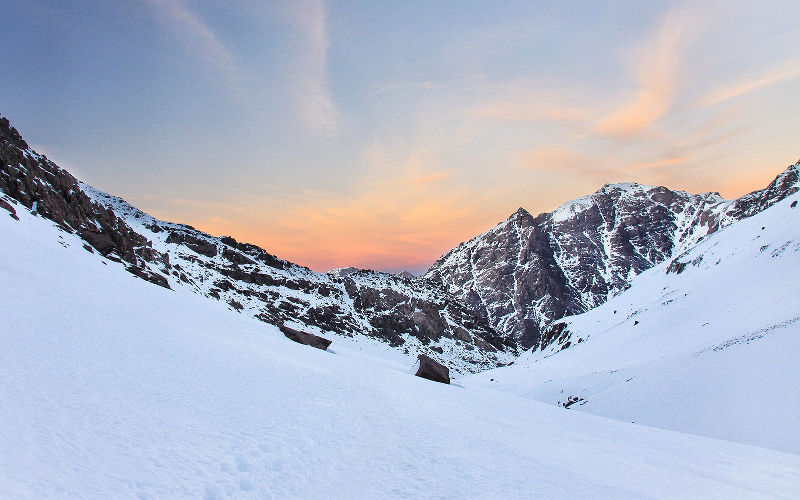
A Toubkal Winter Ascent is an awesome challenge, but does require some technical mountaineering skills.
Independent Trekking vs. Guided Treks
Why Hike Mount Toubkal Without A Guide?
An experienced hiker could most definitely trek Mount Toubkal alone. There are many villages and settlements on your way to the peak in case you get lost. If you are trekking during the spring, you are likely to be surrounded by numerous amounts of hikers who could guide you in case you get lost.
There are two refuges at the base of the mountain (more on this below), where you can get food and sleeping quarters (please note: these refuges get busy during the peak season so booking ahead is advised).
It is important to note that there are many summits in this area. Ensure you are using the correct path to get up Mount Toubkal. Otherwise, you could get lost.
Why Hike Mount Toubkal With A Guide?
If you are not very experienced in hiking at altitude or just prefer having the logistics of a trip arranged for you, then we recommend you employ the services of a guiding company.
Guide companies typically arrange the whole trek for you. This is including accommodation, transport to and from Marrakech, food on the trek and mules to carry gear.
A guided group trekking experience allows you to interact with other hikers. You will have the opportunity to make friends with people who have similar interests.
A guide provides peace of mind, so you can focus more on the views and less looking at a map. They are likely to have gone up Toubkal hundreds of times and know exactly where to go and when to take breaks.
Guides ensure you get plenty of food and water, which is crucial for any trek. There will be water sources along the way but it is best to bring your own water bottle and water purification tablets.
Overall, having a guide is best for convenience and safety. A guide is especially useful when visiting Toubkal in winter due to the dangers of slipping and getting lost in freezing temperatures.
Popular Routes
There are two main approaches to trekking Mount Toubkal - the South and North Side routes. There are a few other variations but these require more experienced hiking and a longer expedition. The most common route begins on the South side.
The Southern route is mostly commonly used because it is significantly easier and has worn paths making the trail easy to follow. It is followed by 98% of trekkers. The Northern approach is a longer route and requires a skilled hiker. Even when taking the more difficult route for the ascent, it is recommended that you use the popular South side route for your descent.
During the spring and summer months, Toubkal is certainly a hike/trek rather than a climb.
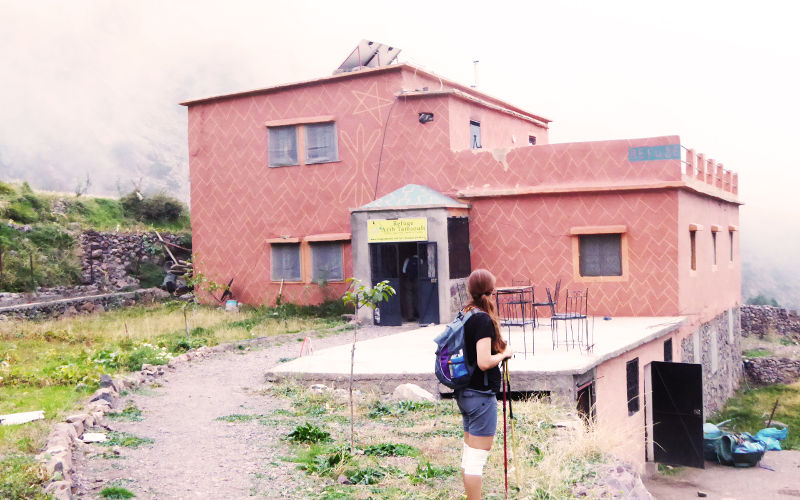
A cool Refuge at Azib Tamsoult.
It is non-technical but moderately difficult due to some steep slopes (no climbing required, but you will need to scramble occasionally) and the high altitude. You should be prepared to walk for several hours each day, depending on the route and duration of your trek. There is a risk of altitude sickness, but this is easily avoided through proper acclimatisation.
During winter, Toubkal becomes a technical hike and requires special gear. You should highly consider booking a guide and ensure you are familiar with using an ice axe and crampons (see details on a winter ascent below).
Trekking Toubkal should take you 4-5 days in order to properly acclimate and allow for a nights rest at Imlil and the refuge.
Join a Mt Toubkal Hike
Book with our recommended local guide
Acclimatisation Hikes
As trekking Mount Toubkal requires your body being at high altitudes, it is crucial to allow time for adjustment.
A rule of thumb is “climb high and sleep low.” It’s important to gain height slowly, about 500m a day once you are at 2,500m. You should be drinking plenty of water as well.
The best way to acclimatize to trekking Toubkal is to start with a good nights rest in Imlil and then stop at one of the refuges to sleep for the night. This allows your body to adjust gradually, as the walk from Imlil to the Toubkal Refuges is about 12km alone.
After spending the night at one of the Refuges, you will wake up early, feeling refreshed, and begin your trek up to the summit of Toubkal.
It is best to begin your trek in the early hours of the morning, with a headlamp, to avoid returning too late in the day and being obligated to sleep at the Refuge again. It is also great to get up to the summit for sunrise!
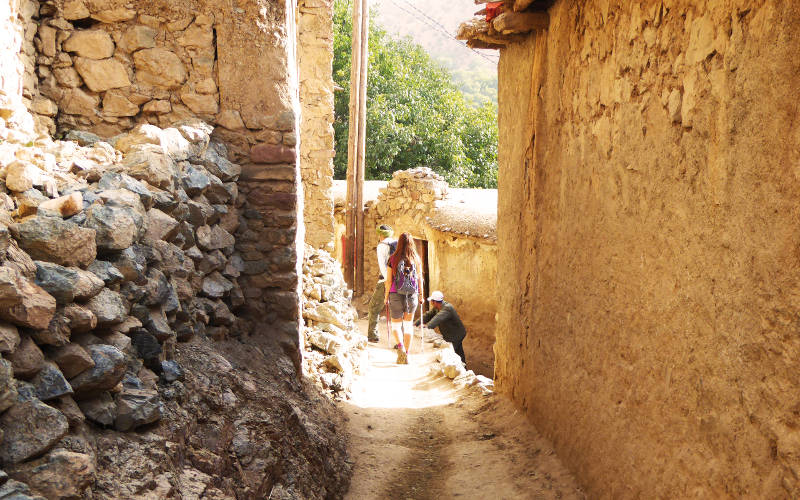
Inside a Berber village. Many of these villagers have Gites (hostels), where you can sleep the night.
Another option to acclimatise is to spend the night in Aroumd. This is on the way from Imlil and the village has plenty of gites (villagers homes) available. This way you would spend one night in Aroumd and the other at the refuge.
For a longer acclimatization, you are able to begin the trek in Ouirgane rather than Imlil. Ouirgane is a Berber village further from Imlil. You will have to spend two nights in different gites before reaching the refuge. This route is ideal for those who want to ensure they are properly acclimatized.
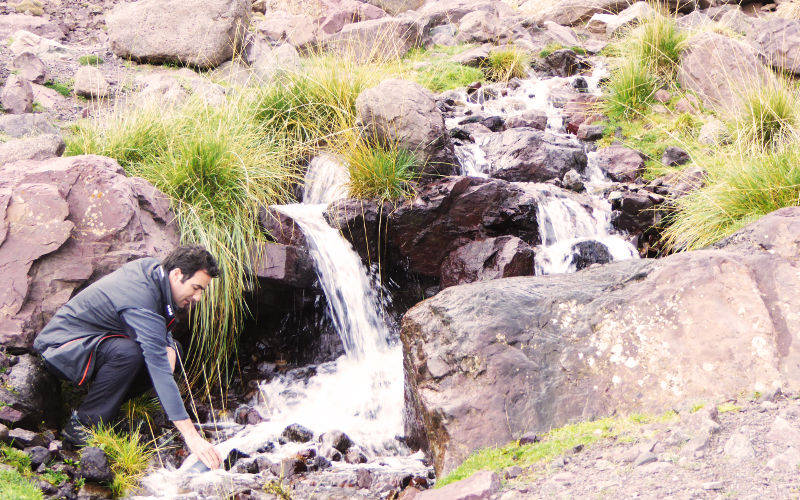
There are many streams in the High Atlas where you can collect water. Just make sure you bring water purification tablets to purify the water.
Toubkal Winter Ascent
Toubkal in Winter is more technical than a Spring or Summer trek as the terrain is completely covered in snow and ice.
Winter ascents of Toubkal start in November and run all the way through to the end of April.
A winter climb of Toubkal is achievable by someone who has never hiked on snow, but we highly recommend you do some basic winter mountaineering practice before undertaking the challenge.
The skills you need to be confident with are:
- Walking in crampons across snowy / ice surfaces, with mixed rock
- Using a straight handle ice axe to sturdy your balance and anchor your hike in areas that are a little exposed
- Confidence on 30-35 degree snow slopes
- Ability to traverse steep sections (sometimes you may need to hold or clip into a fixed rope, although this is rare).
- Ability to scramble up a mixed terrain surface of rock, snow and ice with crampons on
None of these skills are particularly difficult, but if you are doing this for the first time they can be scary and challenging. Hence, why we suggest you get some practice winter mountaineering skills.
Also, at high latitude and when the weather is bad, seemingly easy terrain can appear very challenging.
We recommend taking an experienced guide / joining an organised group if you are not very experienced. Guides are not instructors though. Most will not be able to formally train you on how to hike in snow, use an axe and crampons. It is up to you to determine whether you can handle utilizing these tools and manage on snowy terrain.
Join a Winter Mt Toubkal Hike
Book with our recommended local guide
Toubkal Refuges
Les Mouflons vs. Cabine Alpine Francais (CAF)
When climbing Mount Toubkal, you will most likely begin from the village of Imlil. It will take you about 5-7 hours to get to the Toubkal Refuges. It is not recommended that you complete the trek to Mount Toubkal in one day. You should be stopping here or at other villages to get your rest before completing the trek.
There are two Mount Toubkal Refuges. There is Les Mouflons and Cabine Alpine Fancais (CAF). The Les Mouflons is named after a deer (Mouflons) found in the Atlas Mountains. Cabine Alpine Francais is also called the “Neltner”, named after Mr. Louis Neltner, a geologist, and mountaineer. You are able to book both refuges online in advance.
The Refuges’ are by no means luxury, but they do the job. They are dorm style and have shared bathrooms.
When choosing a refuge, Les Moulfons is less expensive than CAF, so if you are on a budget choose Les Moulfons.
CAF has slightly better amenities (kitchen, rooms, toilet / bathroom facilities) and because of the higher price tends to be less busy.
It is always a good idea to bring some snacks of your own, as the Refuges offer very basic food. Take advantage of your time in Marrakech and purchase some delicious dried fruits and nuts.
If the weather is good and you have camping equipment, it is possible to camp outside the Refuges.
Getting to Morocco and Toubkal
To get to Mount Toubkal, you need to fly into Morocco. The closest big city to Mount Toubkal is Marrakesh. The only international airport in Marrakesh is the Marrakesh Menara Airport. The drive from the airport to Imlil is about 1 hour and 30 minutes. If you are planning to trek with an organised group then most meet in Marrakesh where you will likely overnight and explore the city.
The trip from Marrakesh to Imlil will cost you around 75 dirhams ($8) per person in a shared taxi, or 300 dirhams ($30) in a private taxi. Be careful when taking a private taxi and agreeing on a price. They will overcharge so negotiate with the driver as much as you can. The shared taxi station is near the Sidi Mimoun Garden.
Please note: There is no need to obtain the Moroccan Dirham ahead of your trip. You will be able to exchange currency upon arrival in the airport. It is a good idea to have some cash on you for your taxi, food, and the tipping of guides.
Best Time to Trek Toubkal
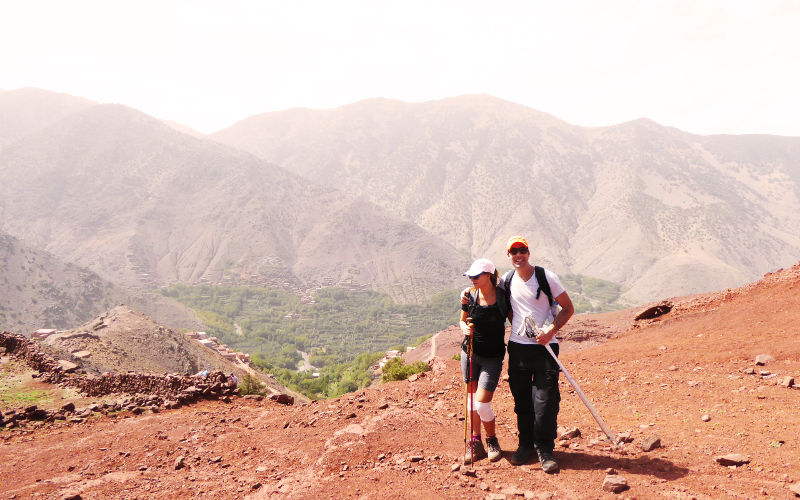
During the Spring and Summer months, the weather is hot throughout the Atlas. Temperatures drop in the evenings and early mornings. Winter months in the High Atlas are cold.
Trekking Mount Toubkal can be done all year round.
The best time to hike is in the Spring, April or May. The weather is not too hot and you are still able to see some snow on the mountains. Due to the rewarding weather, Spring is peak season.
The Summer months - June through to August - are usually very hot. Trekking in the Atlas is fine, but make sure you drink loads of water.
September and October are good shoulder months for trekking.
In Winter, from the month of November to April-May, Toubkal becomes a technical climb. You will need special equipment such as an ice axe, crampons, and fixed rope (see Toubkal Winter Ascents above).
Join a Mt Toubkal Hike
Book with our recommended local guide
How Difficult is Toubkal?
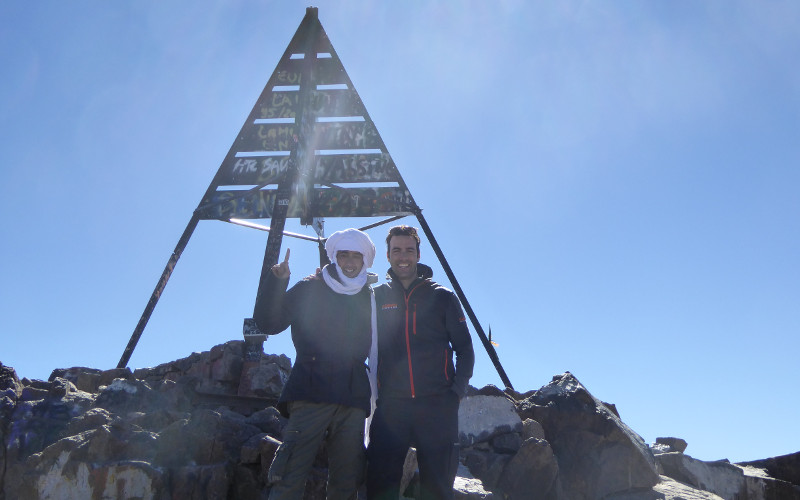
The summit of Mount Toubkal (4,167m)
Toubkal is a moderately difficult hike due to the high altitude. The actual hiking itself is pretty easy and the summit approach from the south side from May-October is relatively straightforward.
Winter ascents from November through to April are much more challenging. To undertake a winter ascent we highly recommend doing a basic winter mountaineering course, where you will learn how to use crampons and an ice axe. You should know the basics of how to do an ice axe arrest and be confident on 30-35 degree snowy slopes.
In terms of training, you will need to be comfortable walking for numerous hours each day for several days. At a minimum you should do one or two multi-day practice hikes that last 4-5 hours a day in your home country.
It would also be smart to build up endurance by doing a month or two cardio gym training before your trek. If you have managed multi-day treks in the past you will do just fine.
Mount Toubkal Gear List
The packing list for climbing Mount Toubkal is relatively straightforward. If you are trekking in the Spring and Summer months, then you can expect pretty good weather. Rain is always a possibility and temperatures in the Atlas mountains do get quite cold at night.
In terms of clothes you should think about layers - base layer, fleece layer, warm outer layer. See recommend items below.
In terms of Winter ascents on Toubkal, you will need more layers - specifically a hard shell waterproof jacket and trousers, a warm outer jacket (down or synthetic) and additional layering for your hands, feet and head. You will also need some technical gear, like crampons (and rigid sole boots that can take crampons), a straight handle ice axe and potentially a harness and carabiners to clip into a fixed rope (please confirm requirements with your tour operator).
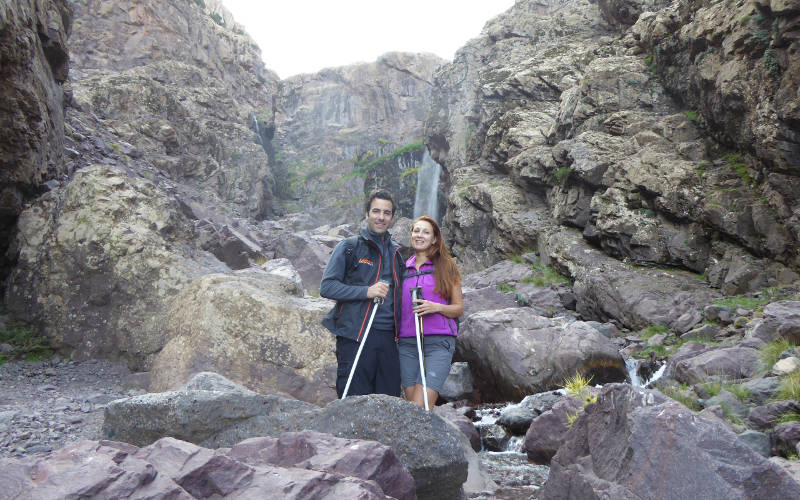
Packing list! In the summer and spring months, the climb doesn't require a lot of gear. Winter ascents will require more gear.
Clothing
- Thermal baselayers (temperatures decrease in higher altitudes)
- Lightweight waterproof jacket
- Fleece jacket or warm jumper
- Trekking trousers and shorts in Summer
- Socks
- Good trainers for valley treks / to wear after a days hiking
- Mid-weight hiking boots
- Lightweight thermal or fleece gloves
- Sunhat/warm hat
- Sunglasses
Gear
- Head torch and spare batteries - the summit push usually happens before sunrise!
- Personal lock (for unattended bags)
- Water purification tablets or water filter
- Trekking Poles
- 4 season sleeping bag (winter), or light 3-season sleeping bag (summer)
- Water bottle
- Soft Sided duffel bag (50-80 liters) - carried by mules. If trekking independently, then a 50-60L backpack.
- Lightweight day pack
Toiletries and First Aid
- Sunblock for body and lips
- Antibacterial hand wash
- First aid kit: antiseptic cream, diarrhea treatment, throat lozenges, painkillers, plaster and blister treatment, hydration salts, insect repellent
Other Items:
- Toilet paper
- Sleeping bag liner
- Therm-a-Rest (cushion for sleeping bag) - optional!
- Camera
- Pen knife (keep in hold luggage when traveling)
- Repair kit (thread, needle, duct tape)
Winter Trekking Gear
- Ice axe - straight handle (60-70cm)
- Crampons - and hiking boots that can fit crampons
- Waterproof hardshell jacket
- Waterproof, lined trousers
- Gaiters
- A warm synthetic or down jacket
- Gloves (inner thin and outer thick pair)
Join a Mt Toubkal Hike
Book with our recommended local guide
Important Info To Know Before Trekking Mount Toubkal
Visa, Vaccinations and Safety
When entering Morocco, you are required to have a passport that has at least 6 months of remaining validity and two blank pages within the passport for entry and exit.
Most countries do not require a tourist visa to enter Morocco for a duration of 3 months. These countries include Britain, Australia, New Zealand, Canada, U.S., Japan, and other EU countries. South African citizens require a visa. Check with your relevant embassy or official Moroccan consulate for other nationalities.
If you are arriving from an area at risk of Yellow Fever, you will need your International Certificate of Yellow Fever.
Other vaccinations that are a point for good measure include diphtheria-tetanus-polio, measles-mumps-rubella, hepatitis A, and typhoid.
Road safety in Morocco is a concern. Make sure you only take rides with licensed taxi drivers and don't be afraid to ask your driver to slow down.
Morocco is a predominately Muslim country and therefore a conservative approach to dress and public behaviour should be adopted at all times. Sexual relations outside of marriage and homosexuality is prohibited. If you are travelling with your partner it is not unusual to be asked to show proof of marriage before checking into a hotel.
For more information on safety whilst travelling in Morocco, check out the UK FCO website.
People, Culture and Other Things To Do
Moroccans are people of Berber, Arab and Arab-Berber descent. The population is 33 million and most people follow the Islamic faith.
Morocco has many other cultural influences from countries like Europe, The Middle East, and Sub Saharan Africa. Women and men dress in a djellaba and men wear a red cap, a burnoose, for special occasions.
Moroccans are known for decorations and rich colours. The red colour is found naturally in most of the buildings. Moroccan cuisine is something you must try while visiting. It is extremely flavourful. Moroccans are famous for couscous, tajine, pastille, halwa, and mint tea served from a traditional long spouted teapot.
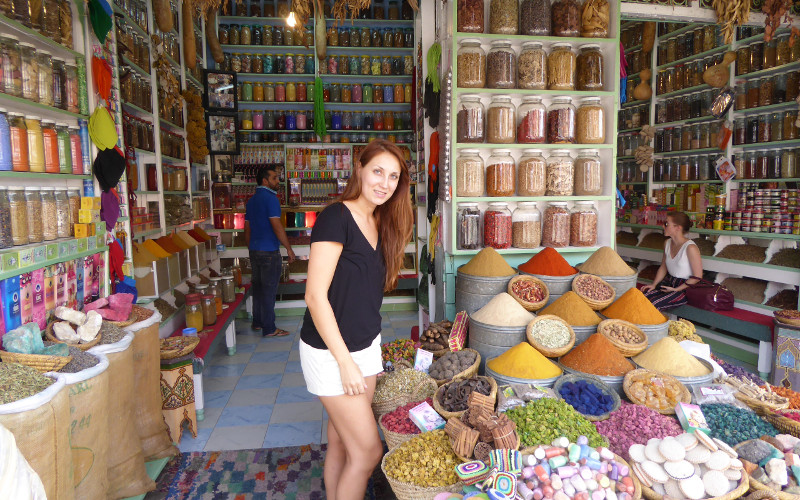 The amazing colours of Morocco!
The amazing colours of Morocco!Moroccans are hospitable and welcoming to tourists. As most people follow the Islamic faith, it is important to be mindful of this. Both men and women need to be considerate of their dress, especially in rural areas. Women should cover their arms and shoulders, and wear garments that cover from the knees up. Men should cover their shoulders and be covered above the knee as well.
When entering a home, it is expected that you remove your shoes and follow the host. You are expected to leave tips. The rule of thumb is waiters at cafes receive about 1dh each, restaurants 5dh, and porters 5dh. However, taxi drivers do not expect a tip.
On Mount Toubkal you are able to go on skiing towers in wintertime, horseback and camel riding in the Atlas Mountains, and visit other mountains and Imperial cities. Morocco has so much to offer other than trekking Toubkal. Whether you want to shop the marketplace of Jemaa el-Fnaa, visit the Majorelle Garden, or explore the Sahara Desert and its wildlife. You are in for a vivid adventure.

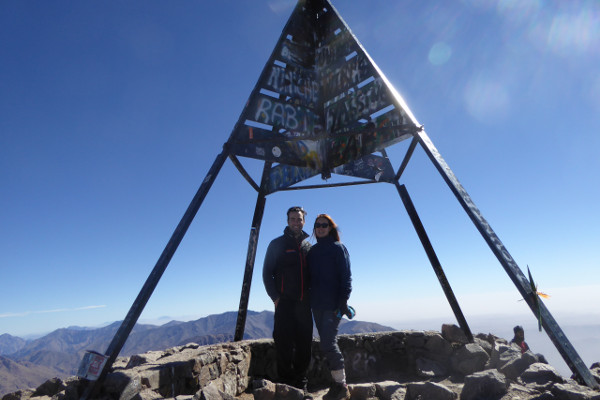
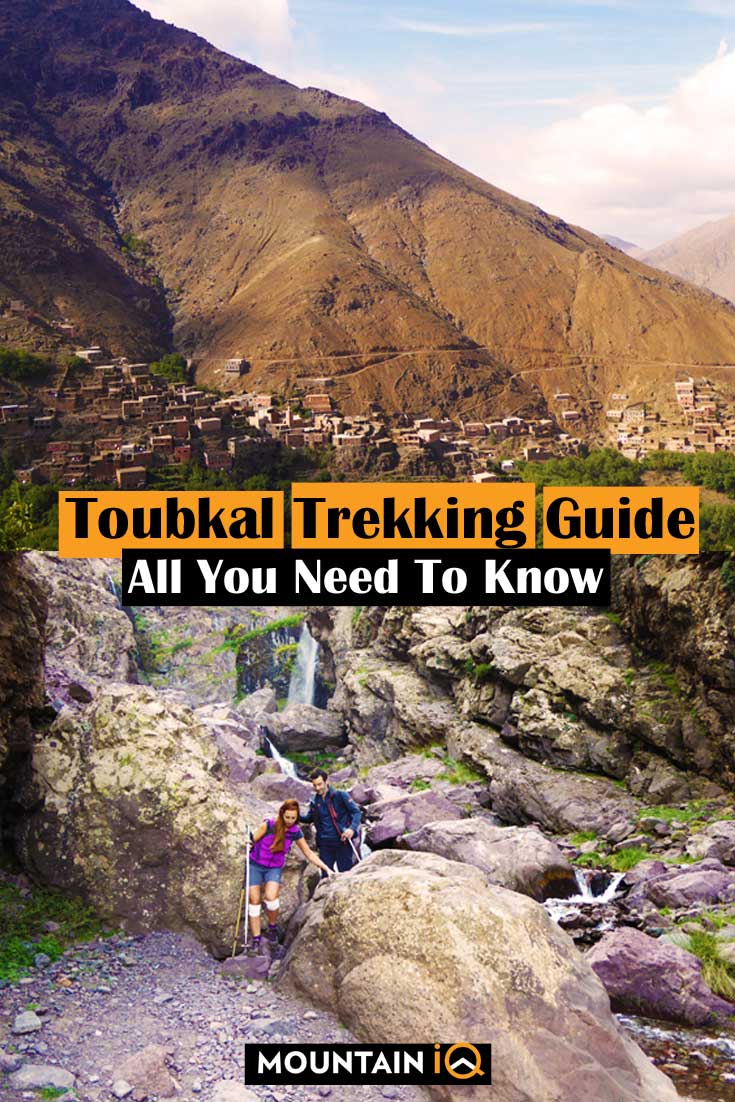
Great information. Thank you for the post.
I will be climbing MT. Toubkal around July 23-24. Flying in Casablanca for a week to climb and tour Morroco.
If anyone's itinerary is similar and would like to join would be great.
23rd Casablanca-Marrakesh-Imlil-Agadir-Essaouria-Safi-Casblanca.
Flu out on July 28
Hi Abraham, you can join an open group trip here: https://www.skyhookadventure.com/trips/toubkal-summer-ascent
Hi! We are going to trekking at the beginning of October. Is it true that taking a local guide from the control post at the village Armed is obligatory? We are experienced mountaineers and I am a certified Mountain Guide in Slovenia. Thanks for the answer.
Hi Marko, it’s been a while since we were in Morocco so things may have changed, but we didn’t need to take a guide when we went in 2014. If you do eeed a guide, you can get a super affordable deal on Skyhook: https://www.skyhookadventure.com/trips/toubkal-summer-ascent
Great info, Thankyou.
My husband has knee pain at the moment (usually comes and goes and settles down with time so he is still able to walk ok) but I’m wondering how bad the actual track is. I’m stressed if his knee is still playing up for our trip in Sept he won’t be able to go. Any extra advice/thoughts would be appreciated! 😫
Hi Mandy, the hike is pretty demanding and you will be on your feet for 5-8 hours a day hiking. The summit push is particularly long and hard. Coming down may be the biggest challenge for your husband. I recommend he takes a knee support and uses trekking poles.
Hi there,
I enjoyed reading your article. I am in Morocco and I really want to hike the Toubkal mount but I want to do it in one day. I think I can say I’m an experienced hiker, recently I hiked Katahdin mountain in Maine USA. It’s not so long, around 8000 meters long and elevation gain of 3,982-ft, this trail is considered very strenuous clim and is very exposed.
Do you think Toubkal can be done in 10-12 hours? And also alone without a guide. Just using trekking apps like Gaia.
Thank you
Yes, Toubkal can be done in a day from Imlil, but you will need to be ultra fit and well acclimatised. Most people hike from Imlil to the refuges, overnight and then do Toubkal in the morning before returning to Imlil in the afternoon.
Very useful thanks. Just a bit surprised with the photo of woman in shorts and short sleeved tee shirt, just above paragraph on considerate dressing!!
Hi – I’m considering doing this trek (probably in September/October time) and was wondering if you could tell me how much exposure there is? I’ve done quite a lot of trekking before but sometimes get a bit nervous if I have to hike along sheer drops for a long period of time. Is there much of this on this trek or is it mainly up the valley to the summit as it appears from your photos? Thank you – Anna.
Hi Anna, Sept / Oct is the summer season so there is basically no serious exposure. There are a few sections that require minor scrambling but in general Toubkal in the summer season is straightforward.
2 Day Climb of Mount Toubkal
My girlfriend and I recently completed the 2 day Jbel Toubkal climb and it was without a doubt the highlight of a fantastic week in Morocco. We booked through Viator and were informed in our confirmation email that private-marrakech-day-trips.com would be our operator.
The transfers to and from the start point of the trek were good with a large and very road worthy 4×4 (i believe they also use these vehicles for the Sahara tours) taking us directly to and from Imlil the start point.
The trek itself is quite tough, with the first day taking 5 hours of uphill walking in moderate heat (this was July) and the second day being around 10 hours of walking! We were quite fit but relatively inexperienced so having a guide was a must. Omar our guide was excellent throughout.
A number of people we met on the mountain did not have a guide which did make me question the need for one. Regarding that question i can say emphatically that IT IS WELL WORTH HAVING A GUIDE! Even if you are a well experienced mountaineer the paths up Toubkal are very steep and not particularly clear at times. We saw many unguided people get abit lost and having to backtrack (usually to follow us). The guide also arranges all your meals and transfer of your excess luggage by mule, your accommodation and more. Having these done for you especially on the short 2 day trek is great. Also i doubt organizing these things would save you much money anyway as in Morocco there is a price the locals pay and a price tourists pay (as with most places).
Top tips:
Take water with you as it is expensive on the mountain and your mule can carry the pre-bought supplies.
If you want a more relaxed pace then go for a 3 day option (2days is quite intense).
Take you camera because the scenery is amazing.
i work as a guide in toubkal massif and i climb mount toubkal once a week everything you said is true
thank you very much for sharing your experience with the world and making our region popular